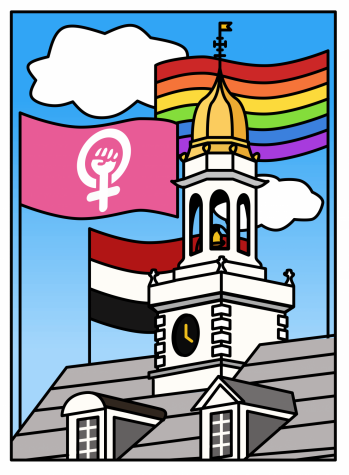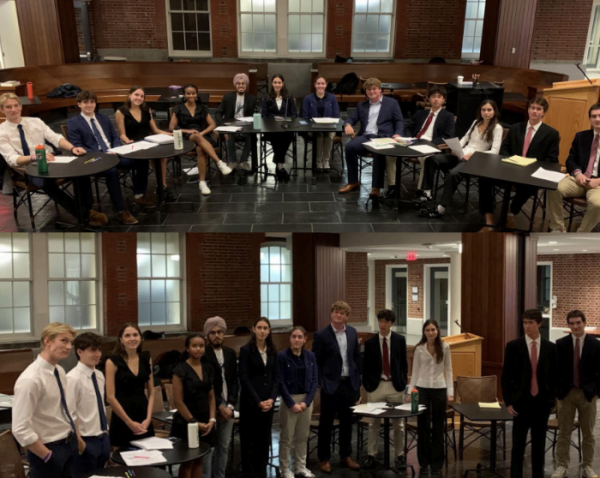Fighting for Sustainability at Groton
The Sustainability Committee, founded in 2018, targets environmental issues which have become increasingly prominent and urgent on our campus. Unfortunately, aesthetics, limited control, and recent Covid-19 safety concerns often precede being environmentally conscious. “The problem hounding sustainability at Groton, in general, is a conflict of prioritization,” noted Sustainability Committee Head Samarth Agrawal ’23. Nevertheless, the committee hopes to find a middle ground between sustainability and the administration’s concerns through ESG and waste disposal proposals.
Sustainability Head Aisling O’Connell ’21 advocated for Environmental and Social Governance (ESG) — a proposal for Groton’s Trustees to consider social and environmental factors before making investment decisions. “ESG could force companies to change their business models if everyone considered ESG in their investing,” noted Aisling. After the Finance Trustees approved ESG, the Sustainability Club heads presented ESG to the whole Board of Trustees at the November Meeting.“The board was very supportive and the ESG policies were passed and implemented right away,” said Aisling.
Although the policy’s approval is a huge feat, Aisling and other sustainability heads strive to hold Groton’s investments even more accountable. “We hope to implement some kind of accountability plan, a collaboration between the trustees and the Sustainability Committee, that will be released to students so that the wider community has a greater idea of what actually goes on with the school’s money. It would be something like a mini annual report that would give rough estimates of what industries our school invests in. We hope this will increase the connectivity between the board and students and boost student input and impact on board decisions,” said Aisling. Furthermore, despite some anticipated initial pushback, the heads are hopeful that the board will eventually reconsider divestment.
While the ESG proposal mostly concerns the Board of Trustees, another major environmental issue within the scope of our campus is waste. Whether due to convenience or a lack of awareness, students are generally disregarding accurate disposal, leading to waste contamination issues. For example, food waste would often find its way into the recycling bin, contaminating and rendering the bin’s contents unrecyclable. The addition of single-use utensils, wraps, and plates in the dining hall due to Covid-19 concerns only exacerbated the problem. In order to combat these issues, the sustainability committee advocates for the reduction of disposables and the waste system redesign they started tackling last year.
As expected, though, eliminating disposable plastic raised plenty Covid-19 concerns.“Our approach is really a balancing act between demonstrating this doesn’t cause any safety harm while insisting that waste remains important to the decision-making process,” added Samarth.
The administration’s reception of these proposals was mixed. Although Ms. Dolan, Groton’s, Chief Financial Officer, supported eliminating disposable plastic, many dining hall decisions rest in the control of the higherup Flik authorities. Nevertheless, the committee is still actively communicating with the dining hall staff to discuss the potential advancement of these proposals.
To combat waste problems more generally, the Sustainability Committee is also proposing a waste system redesign. Currently, the project is in its early stages of development. “The issues we’ve identified right now seem to center around centralization and awareness, so we want to try altering the location and design of containers and testing empirically if that reduces contamination,” said Samarth.
However, pricing and aesthetic concerns also make the implementation of this new system more difficult. Currently, the school house bins have a simplistic design that allows them to blend in with the general aesthetic of the schoolhouse. Making the bins more distinguishable via labelling or color-coding would sacrifice this uniformity. “Last year, waste redesign proposals were pushed back against by the Admissions office who were concerned about the schoolhouse’s aesthetic,” noted Samarth. In response, the committee aims to present more extensive experiment results at the Spring Trustees meeting to justify the cost of a new system. Hopefully, through testing and refinement, this proposal will garner sufficient support.
With many environmental initiatives in progress, it is exciting to see how the Sustainability Committee will impact the school in the future. ESG serves as evidence that with determination, communication, and some compromise, students are indeed able to greenify our campus. “When we reach a point where a majority of students will actively advocate, administrative barriers will not really be a problem because we’re blessed to attend a school that I genuinely believe is willing to improve,” said Samarth.









